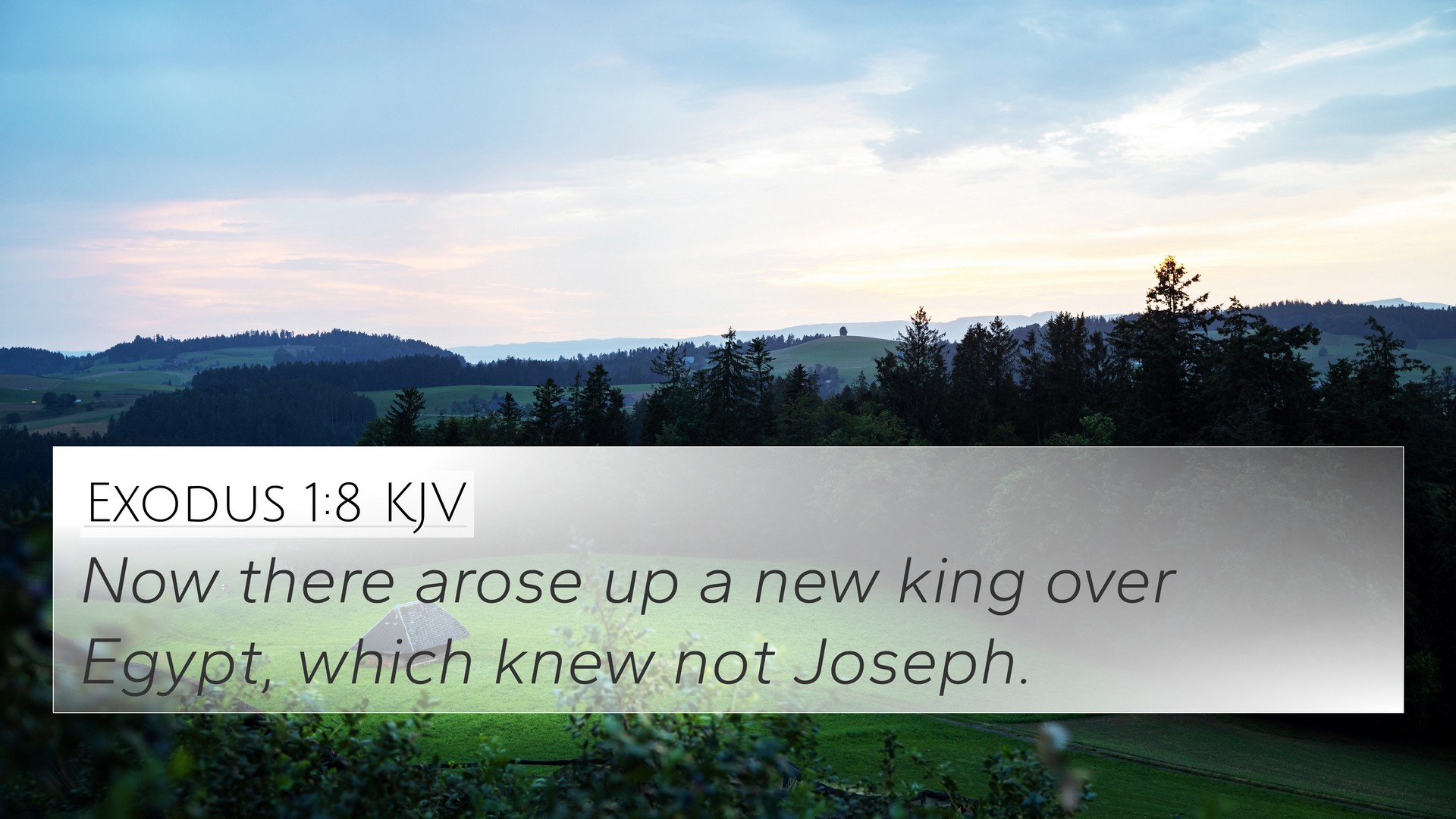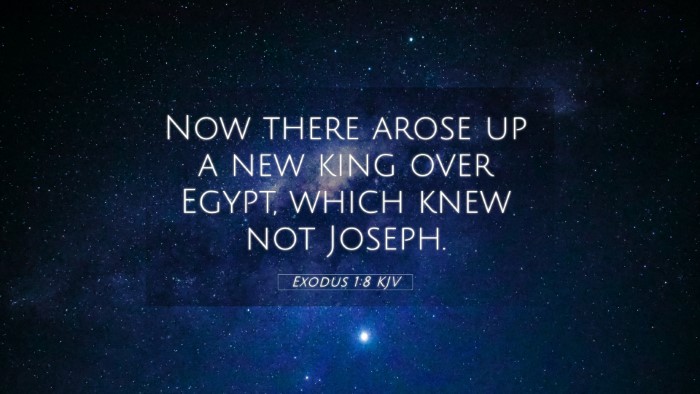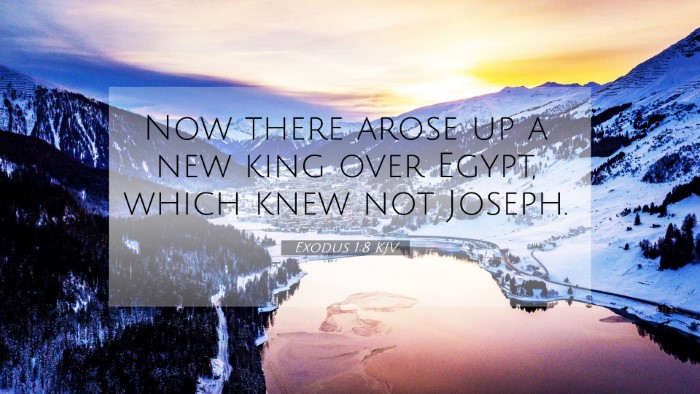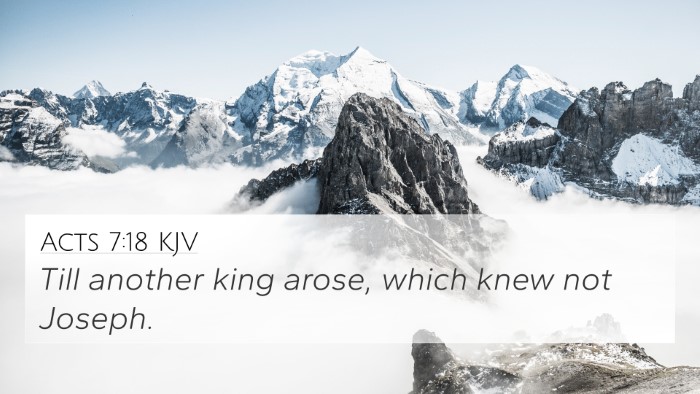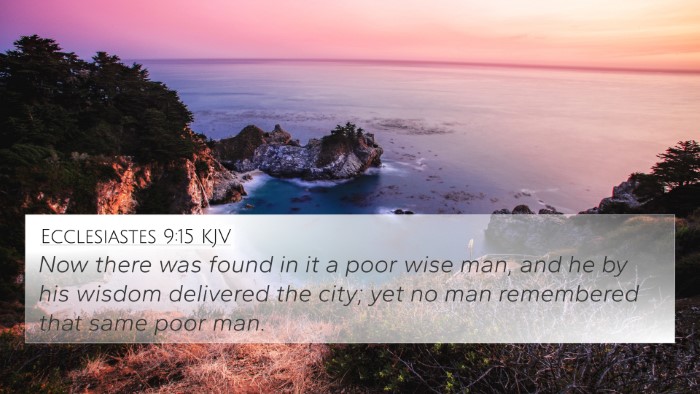Understanding Exodus 1:8
Exodus 1:8 states, "Now there arose up a new king over Egypt, which knew not Joseph." This verse marks a critical transition in the biblical narrative. It signifies the beginning of a period of oppression for the Israelites, who had previously found favor in Egypt due to Joseph's prominence.
Verse Breakdown and Context
This verse is pivotal for understanding the socio-political changes in Egypt that led to the Israelites' suffering. Here are some key themes and explanations derived from public domain commentaries:
- Political Change: The new king’s ignorance of Joseph implies a significant political shift. Joseph was a figure of salvation for Egypt during famine; his lack of memory reflects a disregard for past contributions (Matthew Henry).
- Historical Disconnection: The statement "knew not Joseph" suggests the new ruler's estrangement from Egypt's history, leading to an oppressive mindset toward the Israelites (Adam Clarke).
- Imminent Persecution: This unawareness sets the stage for the hardships that the Israelites would soon face, illustrating the fragility of favor in foreign lands (Albert Barnes).
Bible Verses that Relate to Exodus 1:8
Several scripture cross-references can provide deeper insights and connections to Exodus 1:8:
- Genesis 50:26: The end of Joseph's life and his request regarding his bones; signifies the significance of his legacy.
- Genesis 41:46: Joseph’s rise to power, and how he was instrumental in saving Egypt during famine.
- Deuteronomy 26:5: A reminder of the Israelite's origins and their journey, highlighting the importance of remembering one's heritage.
- Exodus 1:9-10: The king's concern about Israel's growth leading to his oppressive measures.
- Acts 7:18-19: Refers to a new king's rise that did not know Joseph, reinforcing the narrative in Acts of the Israelites' suffering.
- Psalms 105:24-25: God's blessing on the Israelites, contrasting the impending suffering with God’s favor.
- Isaiah 43:1-2: A promise of protection, significantly important during the period of oppression.
Thematic Connections
The themes introduced in Exodus 1:8 reverberate throughout scripture and can be analyzed in light of broader biblical narratives:
- Divine Providence: God's control over nations and their rulers, which can be compared to historical events and the exile themes seen throughout the Bible.
- Forgotten Heritage: The implications of forgetting past leaders and their contributions are timeless, connecting with narratives in Nehemiah and the Gospels.
- Oppression and Deliverance: The cycle of oppression and God’s eventual deliverance, which resonates through the prophetic books and into the New Testament with Christ's advocacy for the oppressed.
Cross-Referencing and Bible Study
Utilizing tools for Bible cross-referencing is essential for digging deeper into the connections between Bible verses. It allows believers to identify thematic links and understand the broader narrative arc of scripture:
- Bible Concordance: A valuable tool that helps locate words and themes in the Bible.
- Bible Cross-Reference Guide: These guides connect verses across both the Old and New Testaments.
- Bible Chain References: A method of tracing theological themes through different scripture passages.
- Cross-Referencing Bible Study Methods: Engaging with multiple verses promotes a comprehensive understanding.
Conclusion
Exodus 1:8 serves as a starting point for exploring the complexities of Israel's history in Egypt, the significance of memory in leadership, and the overarching themes of oppression and redemption in the biblical narrative. Understanding this verse in relation to cross-references expands our comprehension, unveiling the interconnectedness of scripture and its relevance across ages.
Further Study Suggestions
For those interested in a deeper dive into biblical connections, consider examining:
- How to find cross-references in the Bible: Techniques for identifying relevant verses.
- Identifying connections between Old and New Testament: Explore how themes evolve through scripture.
- Comparative study of Pauline epistles: Analysis of themes across the letters of Paul, which often reflect historical narratives like Exodus.
- Cross-referencing Psalms with New Testament teachings: Literacy connections that reveal theological continuities.
